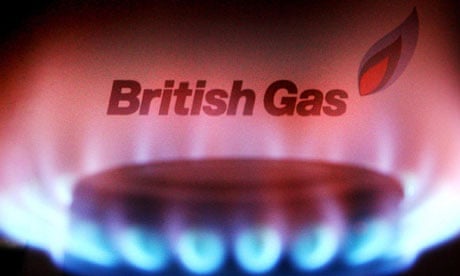Centrica faced renewed criticism over household energy prices as the group reported annual pre-tax profits of £2.4bn, with growth in its gas exploration and power business offsetting a slump in earnings at its British Gas arm.
Despite a balmy 2011 pushing down revenues at British Gas, Centrica was still able to make a profit of around £50 a household from its residential unit. Group pre-tax profits rose 1% in 2011, Centrica said on Thursday, with contrasting fortunes at its two biggest operations. Operating profit at its "upstream" operation, which includes eight power stations in the UK and is one of the largest gas producers in the North sea, climbed by a third to £1bn. The "downstream" operation, dominated by energy provision for 10m UK households, saw the British Gas residential outfit report a 30% fall in operating profit to £522m.
However, household bills remain the subject of scrutiny from the media and the energy watchdog, Ofgem, which has raised the threat of intervention if reforms including changes to tariffs do not work. Sam Laidlaw, the Centrica chief executive, said higher household prices last year were offset by lower usage due to mild weather – reducing the average bill by £37 to £1,024 compared with 2010. Last August, British Gas raised electricity prices by 16% and gas prices by 18%, although it has subsequently cut electricity prices by 5% while leaving gas prices unchanged.
"We need to raise public awareness as to what is on the bill and why bills go up, and that is driven by global wholesale prices," Laidlaw added. Compass, a left-leaning pressure group, accused British Gas and its fellow members of the "big six" UK energy suppliers of making a "quick buck" at the expense of consumers. "We urgently need the government to intervene and impose a levy on the big six energy firms to help people with their bills, coupled with an independent public inquiry into energy just like we've had for banking and the media," said Hayes, Compass general secretary.
Arguing that rising prices are a consequence of forces largely beyond its control, Centrica pointed to wholesale gas prices for next winter, which are 15% higher than for 2011. Nonetheless, a perennial criticism of energy companies is that when wholesale prices climb they are quick to raise tariffs, but are slower to cut them when the wholesale market retreats.
This week another big six supplier, French-owned EDF, said earnings at its UK arm rose 8.5% to £1.6bn in 2011. Laidlaw would not be drawn on the prospect of allowing a further cut in British Gas profits next year to help hold down household bills. "That's a judgement we make all the time. It is a competitive market, that's the whole attraction, which would not be there if we had price caps," said Laidlaw, referring to an early day motion in the House of Commons calling for Ofgem to implement a ceiling on tariffs.
Laidlaw also questioned the probable impact of Ofgem proposals, published this week, to force the big six to auction a quarter of the energy they generate. Ofgem hopes that selling this energy on the forward market, which guarantees supplies for months and years, will help smaller players compete by protecting them from short-term fluctuations in energy prices. Laidlaw said that Centrica already sells "a lot" of the energy that it produces on the open market, but is nonetheless a net buyer of electricity because of the scale of demand from residents and businesses. "As Centrica, we are a net buyer of electricity, so we are in a similar position to the smaller companies." However, Ofgem's attempts to reform the market are backed by the government, with the new energy secretary, Ed Davey, welcoming the "momentum that is building behind badly needed reforms of our energy market".
Laidlaw also reiterated the argument that energy firms need large profits to secure UK energy supplies – Centrica spent £246m on North Sea oil fields this week – and meet climate change goals, which will cost the energy industry £200bn.

Comments (…)
Sign in or create your Guardian account to join the discussion